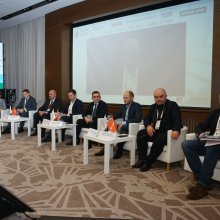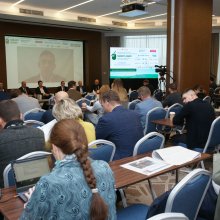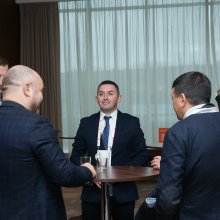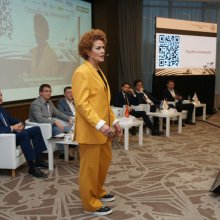About the event
SmartAgro: Digital Field of Opportunities
On October 21, 2021, in Moscow, at the Hilton Garden Inn Moscow Krasnoselskaya hotel, the III Federal IT Forum of the Russian Agro-Industrial Complex “SmartAgro: Digital Transformation in Agriculture” was held. The event was held in a mixed format: some of the participants were present at the site, while the others had the opportunity to connect to the broadcast online.
The event organized by ComNews Information Group (IG) was attended by more than 200 representatives of large agricultural enterprises and corporations of the food industry, peasant farm enterprises, regulatory bodies, state institutions and development funds, domestic developers of IT solutions, software, telecommunications equipment and automatic control systems, telecom operators, application developers, system integrators, as well as business and industry media, industry experts and analysts.
The SmartAgro Forum was held with the support of the “German-Russian Agrarian-Political Dialogue” project, the Department of Agro-Industrial Complex of Tyumen Region, the Eurasian Technological Platform “Technologies of the Food and Processing Industry of the Agro-Industrial Complex – Healthy Food Products” (“TPPP APK” Association), the Russian Union of Flour Mills and Cereal Plants, Non-Commercial Partnership RUSSOFT, the Internet of Things Association.
The innovative partner of the forum was Rostelecom. The silver sponsor of SmartAgro was Rostselmash; the bronze sponsors were ER-Telecom Holding and Nutanix. The session was sponsored by Gazprom Space Systems. The Safety partner was pole.rf. The Forum was held with the participation of PIX Robotics, ElectronAgro Association, GREMION PLUS company.
The plenary discussion was moderated by Leonid Konik, Director General and Editor-in-Chief of ComNews Group. He read out the welcoming speech of Alexey Mayorov, the Chairman of the Federation Council Committee on Agrarian and Food Policy and Environmental Management. The discussion was devoted to the discussion of topical issues related to the digital transformation of the agro-industrial complex.
Oleg Aleksandrov, the Head of the Innovative Technologies Project at Rostselmash, noted that the past year was quite difficult, but actually in agriculture each year is associated with certain challenges. “We faced the fact that very dynamically developing crop production is experiencing difficulties in planning, marketing and pricing. A whole layer of problems connected with mechanization in vegetable growing has also been revealed. And now it is necessary to think broadly and think not only for today. There is also a continuing crisis associated with the lack of personnel, every year this issue is more difficult to resolve. The only benchmark is the introduction of digital technologies, the use of digital analytics”, he said.
Stanislav Varich, Vice President for Strategic Financing of Damate Group of Companies, believes that the problems are multifaceted and deep. He identified three reasons that hinder digital transformation in agriculture: money (not only the resource availability, but also the willingness to spend it on innovation), people (not only IT personnel, but also employees within companies who are ready for implementation and do not sabotage the process ), infrastructure (availability of digital channels, creation of a venture climate to stimulate the development of innovations among teams, infrastructure to encourage and implement projects).
“There are two ways, and both are not without their peculiarities. The first way comes from below. An initiative person says: we need it. And this person needs to go through all the levels, reach the owner and prove to him that innovation is necessary and important. The other way is from above. The owner is shown the solution, he answers: do it. But there is a problem of staff readiness at the lower levels. We need to educate people, to prepare them. Moreover, people perceive technologies as a tool to control responsible executors, and the implementation process itself needs to be controlled”, Stanislav Varich explained.
Sergei Tkachenko, Director of the R&D and IT Department of the Steppe agricultural holding, voiced his view of the problems in the agro-industrial complex: “You cannot do digitalization for the sake of digitalization, you need a goal: understandable, accessible, achievable. And by connecting the entire company, all its divisions, a result should be obtained. Whether it will be increase in revenue or a decrease in costs, the result needs to be, and it needs be thought out at the beginning. Digitalization for the sake of digitalization is doomed to failure”, Sergei Tkachenko concluded.
Rustam Khafizov, Chief Analyst – Head of the Innovation Analytical Center of the Cherkizovo Group, agreed with his colleagues that the main problems are related to personnel and to the formation of an innovation ecosystem. He noted that today the industry should be rapidly transforming, and estimated the shortage of personnel at 90% and the deficit of highly qualified specialists at 30%. Rustam Khafizov said that in the days of Covid, the digitalization helps to increase the level of biosafety, and cited the example of the company’s plant in Kashira, where, thanks to automation, 200 people instead of the usual 800 people are employed to service the machines.
“The time has come when a company alone cannot solve the issue of personnel training: it is necessary to act jointly with science, educational institutions, universities. As part of this work, it is necessary to form a systemic image of agriculture. We are losing the competition for applicants. They think that agriculture still means wooden plow and digging hoe, although this has not been the case for a long time. It requires consolidating efforts in the struggle for applicants”, Rustam Khafizov said.
Sergey Kosogor, Project Manager at the Center for Technology Transfer at the Higher School of Economics, shared his opinion that the agro-industrial complex is experiencing problems in digitalization because of poor planning. Sergey Kosogor believes that if not only the Ministry of Agriculture, but also the Ministry of Industry and Trade (in terms of infrastructure) and the Ministry of Labor (in terms of possibility to retain personnel in the countryside) were involved in solving the problems facing the agro-industrial complex, then such planning would have results. “A plan, a plan, and a plan again”, he shared his vision of solving problems.
Elena Khudyakova, Head of the Department of Applied Informatics, Russian State Agrarian University – Moscow Timiryazev Agricultural Academy, voiced a view of the problems in the digitalization of the agro-industrial complex from the scientific community: “Collaboration of scientific universities with enterprises is still weak. We hope to involve digital business representatives in the educational process”, she said. Elena Khudyakova drew attention to the fact that this year the state has increased the number of budget-funded places in universities by 25%, but not in all specialized universities. “In particular, at the Timiryazev Academy, the number of students in digital areas has doubled”, she said.
“Agricultural enterprises are under pressure from above to use digital technologies, and at the same time we ourselves are consumers of these technologies,” said Lyalya Davletbaeva, Deputy Minister of Agriculture of the Republic of Bashkortostan. She also agreed with colleagues that the lack of staff is a big problem as well as the lack of goals understanding and poor infrastructure. Lyalya Davletbaeva believes that solving problems requires systematic training, as well as transmitting the idea of the digital products’ benefits that allow building an effective production process.
Lyubov Lyubaeva, Deputy Director of the Center for Financial Technologies of Rosselkhozbank, also noted the lack of funding, personnel issues and planning shortcomings as obvious problems. “The most important thing is that there is not enough goal-setting and motivation. People need to understand why they need to engage in the implementation of digital services and innovations, this motivation needs to be found. Large enterprises, business science are the innovations foundry. Not all of these innovations are effective, only some of them will turn into successful tools that could then be replicated in micro and small businesses, which now have no opportunity to develop and apply innovative solutions themselves. I like the idea of building a digital ecosystem that would include representatives of science, banks, large corporations and small businesses”, Lyubov Lyubaeva shared her vision of solving problems. Another option for solving problems that she sees is creating the pipeline of digital services suitable for implementation in small companies. The main thing is that these companies have a motive and purpose for applying these solutions.
Denis Zhukovsky, Director of the agro-industrial department within the corporate customers division of Rostelecom, said that digitalization in the agro-industrial complex in Russia is underway, its speed is increasing, but it is insufficient when compared with the countries of Western Europe, Latin America, North America, and China.
“According to data from open sources, the total IT budget for digitalization of 55 largest Russian agricultural holdings is 471 billion rubles. There is a sum, but it needs to be “digested” properly. In many cases, our digitalization is proceeding by guerrilla methods. There are about 30-40 quite large manufacturers of digital solutions for agriculture. And they all offer solutions to these 55 agricultural holdings. If one of them has caught on to the anchor customer, he will “milk” it to the last. The solution will be so customized that it will never go into production again. Accordingly, we need to move to the stage of integrators. We need a targeted industry integrator”, Denis Zhukovsky said.
Evgeny Norov, the head of innovative projects of ER-Telecom Holding, noted the importance of regional digital exhibitions where solutions are demonstrated and small businesses and farms can look through the benefits of technologies implementation.
In general, the discussion participants agreed that the main problems of digitalization in agriculture are the lack of personnel, the lack of funding, difficulties with infrastructure and planning. They also shared their vision of how to bring the digitalization of the industry to the completely different level.
Session 1 dedicated to the development of precision farming in Russia, was moderated by Sergey Kosogor, project manager of the Center for Technology Transfer at the Higher School of Economics. Lyalya Davletbaeva, Deputy Minister of Agriculture of the Republic of Bashkortostan, spoke about the practical implementation of services and digital solutions in the operational activities of agricultural producers in Bashkortostan. Oleg Aleksandrov, head of the innovative technologies project at Rostselmash, presented a report on the economic benefits of using digitalization in crop production. Evgeny Norov, head of innovation projects at ER-Telecom Holding, shared how to increase yields using digital technologies. Sergey Tkachenko, director of the R&D and IT department of the Steppe agricultural holding, presented a large-scale report “Digitalization and automation in agriculture”. Josef Bosch, the expert of project of the Federal Ministry of Food and Agriculture of Germany, head of the Sustainable Agriculture and Precision Agriculture Academy (Bavaria), member of the German-Russian Agrarian-Political Dialogue, spoke about the practice of using integrated digital solutions in crop production. Ekaterina Uzhegova, Key Account Manager at Nutanix Russia, made a presentation “IT infrastructure of a modern agro-industrial enterprise based on the Nutanix cloud platform”. Yulia Babkina, head of the department for work with end customers of Gazprom Space Systems, said how to optimize costs using satellite communications. Alexander Dichensky, head of the Agroconsulting Center of the Research Institute of Information Technologies of the Ruselectronics holding, made a presentation about the information and analytical system of management for resource-saving crop production “Your Harvest”.
In Session 2, reports were presented on the application of AI technologies, BigData, AgIoT in the agro-industrial complex. The session was moderated by Alexey Trubnikov, Director General of the ElectronAgro Association, founder of the Agronote company. The session was opened by the report of Aleksey Shovkun, the representative of the Ministry of Agriculture of Altai Territory, “Digital service of agrometeorological data of field weather stations of the regional digital platform of the agro-industrial complex IS RESPAK, mobile application of the platform”. Yaroslav Merichenko, Innovation Director of PIX Robotics company, presented the report “RPA as a driver of digital transformation of agribusiness”. Kristina Romanovskaya, owner and director general of Lazarevskoye Breeding Company, spoke about the experience of a full-cycle enterprise in attracting investments in the digitalization of the agro-industrial complex. Konstantin Botalov, Manager for the Agroindustrial Complex Projects of the Department for Work with Corporate Customers of Rostelecom, presented the concept of creating and developing a single operator of agronomic data in the Russian Federation. Alexey Trubnikov, Director General of the ElectronAgro Association, founder of Agronote company, spoke about the prospects for Russian farmers, manufacturers and developers in connection with the digitalization of the agro-industrial complex. Roman Petrenko, Commercial Director of the Pole.rf marketplace, made a presentation “What can marketplaces give to the agro-industrial complex?”. The presentation by Mikhail Nazaruk, Director of GREMION PLUS company, was devoted to innovative solutions in the digitalization of tillage tools. The session was closed by Roman Petrov, director of the information technologies group of the AgroTerra group of companies, with a presentation “New opportunities for predictive analytics in the agro-industrial complex”.
Attention! The IV Federal IT Forum of the Russian agro-industrial complex “SmartAgro: Digital Transformation in Agriculture” will be held on October 20, 2022.







